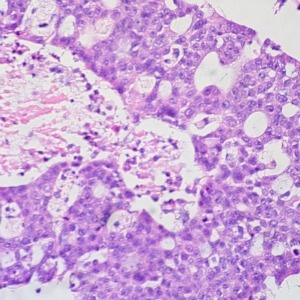GPs need better access to cancer diagnostic tools, research says

Only one in ten GPs said they have the necessary tools to treat pancreatic cancer in enough time, a new poll has shown.
The poll, conducted by Pancreatic Cancer UK, revealed that out of the 1,007 GPs asked, 28% said they don’t have the necessary tools to detect pancreatic cancer at an early enough stage to treat.
Over half of all respondents (51%) also thought the new target set out in the NHS long-term plan, which aims for all cancer patients to receive a diagnosis or ruling out of cancer within 28 days, was not realistic.
The findings are part of the charity’s new campaign to fund £750k in research to develop the first simple test for pancreatic cancer by 2024.
Researchers will aim to improve the accuracy of biomarkers for the disease and collect samples from patients with vague symptoms to test new tools.
Vague symptoms include back pain, weight loss, and indigestion, meaning that the disease often goes undetected until after it has spread. No screening tests currently exist for the disease.
Pancreatic cancer has the lowest survival rate out of 20 common cancers. Statistics from ONS show less than 7% of people with pancreatic cancer survive more than 5 years.
The main aim of the ‘unite-diagnose-save-lives’ campaign is to design a dedicated pathway for pancreatic cancer in the NHS.
RCGP chair Professor Helen Stokes-Lampard said: ‘GPs are acutely aware of how important it is to spot symptoms of pancreatic cancer, but it is notoriously difficult to diagnose in primary care, particularly in its early stages, simply because there are often no symptoms, at all – and when symptoms do present they are often initially very vague, and could indicate many other, more common conditions.
‘The most appropriate intervention to address this paradox is to give primary care teams better access to the right diagnostic tools in the community – and the appropriate training to use them – and we welcome the recommendations set out in this report to do this.
‘GPs are already doing a good job of diagnosing most cancers in a timely way, and it’s due to this hard work and vigilance that 75% of patients found to have some form of cancer are referred after only one or two consultations, and that since 2008 the proportion of cancers diagnosed as an emergency have dropped from 23% to less than 19%.
‘But it’s unsurprising to hear that just one in ten GPs feel as though they have access to the tools needed to diagnose pancreatic cancer, as we are working under immense resource and workforce pressures, and our access to important diagnostic tests are amongst the lowest in Europe.’
Chief executive of Pancreatic Cancer UK Diana Jupp said: ‘For too long pancreatic cancer has been able to silently go undetected, devastating families. Thousands of patients a year, still reeling from hearing the word cancer, are told it’s too late, that nothing can be done for them.
‘That has to stop. We have to give doctors the tools they need to detect the warning signs earlier, so they can ensure those who need it, receive treatment as soon as possible.’
The news comes as the Government’s priority on early cancer diagnosis, with NHS England figures showing GPs referring more patients for urgent cancer checks than ever.
Earlier this year, as part of NHS England’s long-term plan, GPs were given fewer barriers to making cancer referrals in a bid to catch more cancers earlier.
Visit Pulse Reference for details on 140 symptoms, including easily searchable symptoms and categories, offering you a free platform to check symptoms and receive potential diagnoses during consultations.









